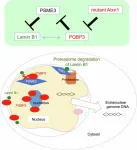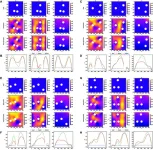Tokyo Medical and Dental University (TMDU) researchers elucidate the role of PQBP3 in stabilizing the nuclear membrane and its relationship to senescence and neurodegeneration
Tokyo, Japan – Aging is the prime cause of neurodegenerative diseases, such as Alzheimer’s disease, Parkinson's disease, and amyotrophic lateral sclerosis. But what exactly increases the prevalence of these brain disorders as one grows older? The molecular forces linking aging, cellular senescence, and the onset of these neurodegenerative conditions are not well understood.
In a recent study published online on August 5 2024 in The EMBO Journal, researchers from Tokyo Medical and Dental University (TMDU) in Japan have uncovered a crucial piece of this puzzle by focusing on the role of a single nucleolar protein.
A research team led by Professor Hitoshi Okazawa revisited polyglutamine binding protein 3 (PQBP3), a protein they had discovered themselves over 20 years ago. Through a comprehensive screening of normal proteins that bind to disease-causing proteins in polyglutamine diseases such as Huntington’s, they identified several proteins in the PQBP family. After exploring the functions and pathological relevance of PQBP1 and PQBP5, Prof. Okazawa and colleagues turned their attention to PQBP3.
To shed light on the role of this protein, the researchers employed cellular senescence as a model to study aging. Senescence refers to a state in which a cell no longer undergoes division, but remains alive and metabolically active. This state, which can be replicated in cell cultures, occurs naturally in our bodies and is typically observed in aging cells.
Through super-resolution fluorescence microscopic observations, the researchers observed something peculiar about the location of PQBP3. “PQBP3 typically localizes around the periphery of the nucleolus within the nucleus, but during senescence, PQBP3 relocated from the nucleolus to the nucleoplasm or cytoplasm,” says Prof. Okazawa. He adds, “This relocation of PQBP3 was accompanied by leakage of nuclear DNA into the cytoplasm. Most importantly, we then observed via electron microscopy that the nuclear membrane structure was destabilized in cells where PQBP3 had moved to the cytoplasm.”
To shed light on this destabilization of the nuclear membrane, the researchers conducted a bioinformatics analysis using protein interaction databases. The results suggested that PQBP3 binds to a protein called proteasome activator complex subunit 3 or PSME3, which plays a key role in the degradation of other proteins. Upon further investigation, the team found that, under normal circumstances, a portion of PQBP3 moves from the nucleolus to the nuclear membrane and binds to PSME3, suppressing its degradation of Lamin B1, another protein found in the nuclear membrane. However, the rate of these changes declines in senescent cells and thus Lamin B1 is degraded more rapidly, thereby failing to stabilize the nuclear membrane.
Finally, to link these findings to neurodegenerative disorders, the researchers conducted experiments in cell cultures and mouse models of spinocerebellar ataxia type 1 (SCA1), a polyglutamine disease. They found that PQBP3 was ‘captured’ by the so-called inclusion bodies, which are abnormal protein aggregates characteristic of SCA1. In turn, this lowered the levels of PQBP3 in the nucleolus, limiting its functionality and leading to the destabilization of the cellular membrane.
Taken together, the results of this study shed light on a possible common aspect of aging and neurodegenerative disorders. This newfound understanding of PQBP3 renders it a potential target for novel treatments as Prof. Okazawa remarks, “Since PQBP3 function loss can occur in both cellular senescence and neurodegeneration in brain neurons. Therefore, targeting PQBP3 theoretically makes it possible to improve both brain aging and neurodegeneration.” However, in cells other than neurons, PQBP3 can be a risk factor for cancer, given that cellular senescence likely helps suppress cancer. “PQBP3 may be a double-edged sword, as it is involved in a fundamental biological problem of contrasting cellular pathologies, namely cancer and neurodegeneration,” warns Prof. Okazawa.
In summary, unraveling the connection between aging and neurodegeneration could pave the way for novel and effective therapies for these diseases.
###
The article, “PQBP3 prevents senescence by suppressing PSME3-mediated proteasomal Lamin B1 degradation,” was published in The EMBO Journal at DOI: 10.1038/s44318-024-00192-4
END
Unveiling the molecular mechanisms linking aging with neurodegenerative diseases
2024-09-03
(Press-News.org)
ELSE PRESS RELEASES FROM THIS DATE:
Keep devices out of bed for better sleep – Otago study
2024-09-03
Despite what we’ve been led to believe, the timing of evening screen use, rather than the activity itself, negatively impacts youth sleep, a University of Otago study has found.
Current sleep guidelines recommend no screen use in the hour or two before bed. However, the researchers found screen time in the two hours before bed had little impact on youth sleep, it was screen time once in bed that caused problems.
Lead author Dr Bradley Brosnan, of the Edgar Diabetes and Obesity Research Centre, says screen time is a mainstay in adolescents’ bedtime routines, and sleep guidelines need to be revaluated to better reflect modern life.
Published in JAMA Pediatrics, ...
Dr. Torabi to study vulnerabilities in electric vehicle charging management systems
2024-09-03
Dr. Sadegh Torabi, Assistant Professor, Information Sciences and Technology, College of Engineering and Computing (CEC), and Research Fellow at the Center for Secure Information Systems (CSIS), is set to receive funding for the project: “Collaborative Research: CISE MSI: RPEP: OAC: Macroscopic and Microscopic Inference and Analysis of Vulnerabilities within EV Charging-Management Systems.”
Via this project, Dr. Torabi and his partners will establish a collaborative ecosystem among academia, industry, and the public sector to bolster the resilience of the EV Charging Infrastructure (CI). The critical nature of EV CI has made them targets for malicious attacks, often state-sponsored, ...
Think simpler, flow faster
2024-09-03
Analyzing and simulating fluid flow is a challenging mathematical problem that impacts various scenarios, including video game engines, ocean current modeling and hurricane forecasting. The core of this challenge lies in solving the Navier–Stokes equations, a set of classical equations that describe fluid dynamics. Recently, deep learning has emerged as a powerful tool to accelerate equation solving. Using this technique, a team designed a novel approach that can provide accurate solutions 1,000 times faster than traditional equation solvers. The team’s study was published June 26 in Intelligent ...
Eating fish but not omega-3 supplements during pregnancy associated with lower likelihood of autism diagnosis, NIH-funded study finds
2024-09-03
Eating any amount of fish during pregnancy was associated with about a 20% lower likelihood of autism spectrum disorder (ASD) diagnosis, particularly in females, and a slight reduction in autism-related traits in offspring, according to a new study funded by the Environmental influences on Child Health Outcomes (ECHO) Program at the National Institutes of Health.
However, researchers did not find the same association with supplements containing omega-3 fatty acids.
Fish is an important source of omega-3 fatty acids, an essential nutrient during pregnancy for supporting maternal health and child neurodevelopment. A recent analysis of ECHO Cohort data revealed that about ...
Study: racial and ethnic designation inaccuracies in children’s medical records may impede equity efforts
2024-09-03
ANN ARBOR, Mich. – Leaders at three Michigan hospitals aiming to address equity issues for pediatric patients wanted to start with inspecting data key to identifying potential inequities.
What they learned: much of those data are inaccurate.
A study from the Michigan Child Health Equity Collaborative, or Mi-CHEC, found substantial errors across the three health systems in racial and ethnic designations in their electronic medical records. Accuracy of these designations are important to clinical care improvement ...
Penn study finds taking semaglutide for weight management does not increase risk of depression or suicidal behavior in people without known major psychopathology
2024-09-03
PHILADELPHIA— Taking the weight loss medication semaglutide did not increase the risk of depressive symptoms, suicidal thoughts, or suicidal behavior in persons without known major mental health disorders, according to a new study led by researchers from the Perelman School of Medicine at the University of Pennsylvania published this week in JAMA Internal Medicine. Both the Food and Drug Administration (FDA) and the European Medicines Agency are actively monitoring the psychiatric safety of semaglutide and similar medications after post marketing surveillance reports of depression, suicidal thoughts (ideation), ...
GLP-1 receptor agonist use and risk of suicide death
2024-09-03
About The Study: This cohort study, including mostly patients with type 2 diabetes, does not show an association between use of glucagon-like peptide-1 (GLP-1) receptor agonists and an increased risk of suicide death, self-harm, or incident depression and anxiety-related disorders.
Corresponding Author: To contact the corresponding author, Peter Ueda, MD, PhD, email peter.ueda@ki.se.
To access the embargoed study: Visit our For The Media website at this link https://media.jamanetwork.com/
(doi:10.1001/jamainternmed.2024.4369)
Editor’s ...
Psychiatric safety of semaglutide for weight management in people without known major psychopathology
2024-09-03
About The Study: The results of this post hoc analysis suggest that treatment with semaglutide, 2.4 mg, did not increase the risk of developing symptoms of depression or suicidal ideation/behavior vs placebo and was associated with a small but statistically significant reduction in depressive symptoms (not considered clinically meaningful). People with obesity should be monitored for mental health concerns so they can receive appropriate support and care.
Corresponding Author: To contact the corresponding author, Thomas A. Wadden, PhD, email wadden@pennmedicine.upenn.edu.
To access the embargoed study: Visit our For The Media website at this link https://media.jamanetwork.com/
(doi:10.1001/jamainternmed.2024.4346)
Editor’s ...
One minute to save lives: Teaming up with pediatricians to secure firearms
2024-09-03
Large study included 47,307 well-child visits at 30 clinics in Michigan and Colorado
Almost 50% of clinicians receiving a prompt plus added support delivered a secure firearm storage program during well visits versus just 22% of doctors receiving prompt only
Firearm-related injuries are the leading cause of death for young people in the U.S.
‘We can save lives’ with a brief program to support parents in secure storage
CHICAGO --- If it takes a pediatrician less than one minute per visit to talk to parents about how to securely store their firearms and offer a free cable lock, why do only 2% of doctors report routinely doing so?
Turns out, they ...
No link found between popular diabetes medication and suicide
2024-09-03
There has been concern that common diabetes drugs could increase the risk of suicide and self-harm. In a new study, led by researchers at Karolinska Institutet and published in Jama Internal Medicine, no such risk increase was observed.
Drugs of the type GLP-1 analogues lower blood sugar levels and are used by millions of people worldwide. They are mainly used to treat diabetes, but drugs such as Ozempic have also been shown to be effective against obesity, which has increased their popularity.
At the same time, both American and European drug authorities have warned that there may be risks associated with ...




